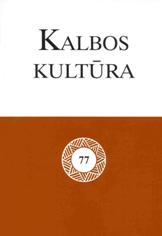Pora keblesnių derinimo atvejų administracinėje kalboje
On several complicated cases of concordance in administrative language
Author(s): Rasuolė VladarskienėSubject(s): Language and Literature Studies
Published by: Lietuvių Kalbos Institutas
Keywords: Agreement; case; preposition; postposition; conjunction; administrative language
Summary/Abstract: The paper deals with several complicated cases of attribute agreement. Agreement problems arise when: a) there are several words in succession and they are all modified by attributes, b) there are several attributes in succession. The attributes preceding a series of modified words are in the same number and gender form as the attribute that stands closest to the modified word. In very rare cases, modified words in the singular can be used with attributes in the plural number. The attribute that follows a series of modified words is usually joined semantically (it is used in the form of masculine plural). Concordance with the closest modified word is only possible when there is explicit reference to the modified word and other words related to it by coordination. In administrative language concordance laws of attributes in preposition and postposition and predicates with several modified words and the subject are alike. When the features of several words are referred to by a non-nuclear member of the sentence, it is joined with the help of the pronoun kurie (Eng. 'which') in the required case in plural. When there are several attributes in singular and they require concordance and are joined by coordinative conjunctions or without them, and there are several objects discussed, the modified words in administrative language usually occur in plural. In other areas of language use the form of the number might vary.
Journal: Bendrinė kalba (iki 2014 metų – Kalbos kultūra)
- Issue Year: 2004
- Issue No: 77
- Page Range: 46-55
- Page Count: 10
- Language: Lithuanian

